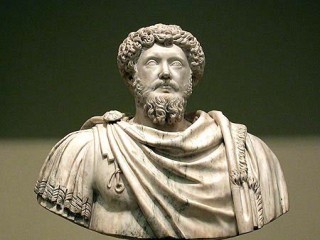
Marcus Aurelius biography
Date of birth : 0121-04-26
Date of death : 0180-03-17
Birthplace : Rome, Italy
Nationality : Italian
Category : Historian personalities
Last modified : 2010-05-24
Credited as : Roman Emperor, Lucius Verus, The Meditations
Marcus Aurelius' work Meditations, written in Greek while on campaign between 170 and 180, is still revered as a literary monument to a government of service and duty.
Although his rapid succession to emperor is unknown, Marcus Aurelius became a member of the Stoic Philosophers. His leadership fulfilled the hopes of many who had wanted both an intellectual with an open social mind to lead the Roman people.
Young Marcus was brought up in the most elite manner of his time. His family was of nobility in any direction turned to in his family tree. Receiving the finest education, he was also named Vernus or “true” by the current emperor named Hadrian. One of Marcus’ teachers was none other than Fronto, a staunch rhetorician, along with Diognetus, who influenced Aurelius to become a member of the stoicism movement under his leadership. Antoninus allowed Marcus to learn from him from a very young age how he too might rule Rome.
According to the notoriously unreliable Historia Augusta, he is the great-great-great-great-great-great-great grandson of Pompey the Great through his daughter Pompeia Magna. His paternal grandmother Rupilia was the great granddaughter of Scribonia (daughter of Lucius Scribonius Libo consul 16) , who was herself the great granddaughter of Pompey the Great on both her parents side. This makes Marcus Aurelius and his son Commodus the only emperors directly related to the son-in-law and rival of Julius Caesar.
In a strange occurrence, Marcus Aurelius wanted his adoptive brother Verus to also become an emperor beside him. After repeatedly insisting, Verus was made an equal emperor with Marcus Aurelius and thereafter Rome would have two emperors who ruled astonishingly well together. When Aurelius came to power, war was eminent with Parthia who had and defeated the Romans repeatedly, namely in Syria. Verus was sent to lead the army in Armenia, even though he was not trained in military services. When Rome was finally able to take Parthia, a plague that killed off many of the soldiers was subsequently carried to Rome and annihilated over 25% of the Roman population.
By around 170, Marcus Aurelius was ruling the empire alone because of the death of his friend and co-emperor Verus. Due to a revolt by Avidius Cassius to the east, Aurelius was forced to call off other wars he was fighting in the west. He was forced to end his struggle with Germany and look towards ending Cassius’ plight. After Aurelius’ soldiers killed Cassius, the threat lessened. Marcus took it very easy on those who had supported Cassius and remained in the east to make sure his rule and balance was restored. Commodus, Marcus’ son, was given the title of Augustus and would share the throne with his father. After the celebration, however, the Roman Empire began persecuting Christians who his advisors had warned Aurelius were dangerous "fundamentalists" not good for the future or well being of the empire. And, while again at war with the Germans, Marcus died before Rome saw victory, but Aurelius was made into one of many Roman gods. Although no records of the biography of Marcus Aurelius was ever completed, the records of the Roman scribes and historians of the day show he was very much liked by his people and ruled with good-nature and fortitude. His work often referred to as The Meditations, shows his love for mankind through his Stoic philosophy that always looked for harmony.
Legacy and reputation
Marcus Aurelius took on the reputation of a philosopher king within his lifetime, and the title would remain his after death; both Dio and the biographer call him "the philosopher". Christians—Justin Martyr, Athenagoras, Melito—gave him the title too. The last named went so far as to call Marcus "more philantrophic and philosophic" than Pius and Hadrian, and set him against the persecuting and emperors Domitian and Nero to make the contrast bolder. "Alone of the emperors," wrote the historian Herodian, "he gave proof of his learning not by mere words or knowledge of philosophical doctrines but by his blameless character and temperate way of life."
















